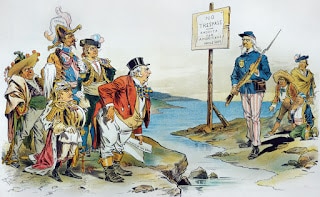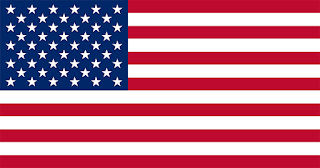Exactly 200 years ago, on December 2, 2023, the Administration of President James Monroe sent its annual message to Congress. (In his typically misguided anti-monarchism, Thomas Jefferson had abolished the practice of the President delivering the State of the Union Address in person, lest it too much resemble the British monarch’s annual Speech from the Throne. The custom was only restored in 1913 by would-be monarch Woodrow Wilson.)
In his message, written largely by Secretary of State (and future 6th President of the United States) John Quincy Adams, Monroe articulated a set of policies and principles which were subsequently interpreted together as a key component of U.S. foreign policy for most of the next two centuries as the « Monroe Doctrine. » In its original form, the « Monroe Doctrine » asserted that the American hemisphere was no longer open for colonization by Europeans. The U.S. would not contest or interfere with existing European colonial possessions in the Americas but would oppose any European attempts to contest or interfere with the newly independent nations of North and South America.
The occasion has been judged proper for asserting, as a principle in which the rights and interests of the United States are involved, that the American continents, by the free and independent condition which they have assumed and maintain, are henceforth not to be considered as subjects for future colonization by any European powers. …
We owe it, therefore, to candor and to the amicable relations existing between the United States and those powers to declare that we should consider any attempt on their part to extend their system to any portion of this hemisphere as dangerous to our peace and safety. With the existing colonies or dependencies of any European power, we have not interfered and shall not interfere. But with the Governments who have declared their independence and maintained it, and whose independence we have, on great consideration and on just principles, acknowledged, we could not view any interposition for the purpose of oppressing them, or controlling in any other manner their destiny, by any European power in any other light than as the manifestation of an unfriendly disposition toward the United States.
As every student of American history has been taught, this pronouncement of American policy was largely hortatory, in that the U.S at the time hardly had the ability to enforce its will against the powers of Europe, especially if allied together against the U.S., as it was feared the « Holy Alliance » might do in an attempt to recover some of europe’s lost American colonies. What made the policy effective was its tacit support by the United Kingdom. The British empire had no interest in contesting or interfering with the independence of the new Latin American states and in fact stood to benefit in true terms from their new status. So the British Royal Navy could be counted on to protect the American continent from invasion. Contrary to the later isolationist myth that it was the ocean that kept America free from European entanglements, it was in fact Britannia ruling the waves which enabled American isolation.
Even so, the « Monroe Doctrine » did not prevent all European (primarily Spanish) efforts to reconquer former colonies, although such efforts were largely unsuccessful. The 19th-century European intervention that came closest to success was, of course, Napoleon III’s attempt to establish an empire in Mexico with an Austrian Hapsburg Archduke on its throne. The U.S. at the time was preoccupied with its own Civil War, but eventually supported the indigenous anti-French forces of Benito Juárez. While the U.S. has always seen it in its interest to oppose European influence in the Americas, I have often wondered whether Mexico might have been better off – and more genuinely independent vis-a-vis the U.S. – if it had kept the strong European connection created by having a Hapsburg Emperor. But it was not to be.
In any case, as things turned out, the « Monroe Doctrine » has been as much about maintaining U.S. hegemony in the Western Hemisphere as about protecting other American nations from foreign interference.
In my lifetime, of course, we heard a lot about the « Monroe Doctrine » in regard to Castro’s Cuba. The 1959 Cuban Revolution and Castro’s eventual alliance with the Soviet Union seemed to challenge not only U.S. hegemony in the Americas but U.S. security itself in the case of the 1962 Cuban missile crisis, in which President Kennedy explicitly invoked the « Monroe Doctrine. » The subsequent withdrawal of Soviet missiles from Cuba, combined with the U.S. promise not to invade Cuba created a new set of facts, which signified a new notion of the applicability and relevance of the « Monroe Doctrine. »
In that new context, the « Monroe Doctrine » nonetheless continued to be invoked in response to Communist Cuba’s efforts to export revolution in the hemisphere. In 1984, the CIA Director Robert Gates argued that the alternative to U.S. support for the opposition to the Sandinista government in Nicaragua would be « totally to abandon the Monroe Doctrine. »
With the demise of Soviet communism it is hard to imagine any classical form of foreign threat to the independence of any American nation, but it remains very easy to imagine a Latin American government that, rhetorically at least, threatens the real or perceived hegemony of the U.S. in the hemisphere. As late as 2019, however, National security Advisor John Bolton stated: « In this [Trump] administration, we’re not afraid to use the word Monroe Doctrine. »
Thus, the « Monroe Doctrine, » like so much of our inherited legacy from the very different world of the founding era, seems to remain in dubious reserve for whatever ambiguous ends it may yet be employed.
Image: ‘Keep Off!’ American cartoon depicting the Monroe Doctrine, by F. Victor Gillam, 1896. Granger/Bridgeman Images.





